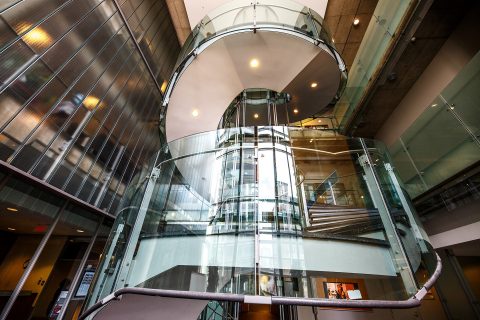Civil Engineering (MASc)
Program overview
The MASc in Civil Engineering increases your technical knowledge in the planning and designing of facilities, their construction processes, their operation and their impact on the surrounding environment. The program strengthens specific areas of knowledge gained at the undergraduate level and provides an introduction to graduate research. Students interested in the course-work masters program should refer to the MEng Program instead.
Program structure
Specialized Branches
The Department offers a research-based degree (MASc) with specialization in one of the following six branches:
- Structural and Infrastructure Engineering
- Water Resources Engineering
- Geotechnical Engineering
- Transportation Engineering
- Environmental Engineering
- Construction Engineering and Management
Degree Requirements
The requirements described here are in addition to the general degree requirements for the Master/Magisteriate in Applied Science (MASc) in the Gina Cody School of Engineering and Computer Science.
Fully-qualified candidates are required to complete a minimum of 45 credits.
Please see the Engineering Courses page for course descriptions.
Civil Engineering MASc (45 credits)
| 16 | credits of Coursework, with four courses chosen from the Engineering Courses section, approved by the student’s supervisor and either the Graduate Program Director or the Chair of the Department. |
| 29 | credits:
|
Admission requirements
Proficiency in English
Proficiency in English. Applicants whose primary language is not English must demonstrate that their knowledge of English is sufficient to pursue graduate studies in their chosen field. Please refer to the English language proficiency page for further information on requirements and exemptions.
Application process
Application deadlines

FALL
July 1 (Canadian resident)
March 1 (U.S. and international)

WINTER
November 1 (Canadian resident)
July 1 (U.S. and international)

SUMMER
March 1 (Canadian resident)
November 1 (U.S. and international)
Priority will be given to complete applications submitted by the deadline. In some cases, programs may continue to accept applications as long as there is space available.
International students: Considering the waiting period involved in meeting the entry requirements to Canada and Quebec, we strongly encourage international applicants to apply early and submit supporting documents prior to the deadline.
Tuition & funding
Tuition and fees
Tuition and fees of the program may depend on your student status, among other key factors. Estimate these costs based on the most common situations.
Awards and funding
Funding packages are generally available for students in thesis-based programs. They come in the form of awards, teaching and research assistantships are offered at the time of admission to most students to allow them to focus on their research and studies. Research and thesis-based students are automatically considered for all entrance graduate awards when they apply to Concordia, provided they meet eligibility criteria. No separate application is required.
The Quebec and Canadian governments offer a number of competitive graduate scholarships. We encourage you to apply for these awards at the same time you are preparing your application.
Out-of-province students
Get $10,000 in special funding for thesis master's programs. Learn more
Other programs of interest

Strengthen your undergraduate engineering degree by diving into graduate research in building engineering subfields including building science, construction management, energy efficiency and rehabilitation of urban infrastructure.
Department
Department of Building, Civil and Environmental Engineering
Faculty

Strengthen and extend your knowledge as a practising civil engineer, to further develop your analytical skills, and to enhance your ability to comprehend advanced technology concepts and solve complex problems.
Department
Department of Building, Civil and Environmental Engineering
Faculty

